
Computational Condensed Matter
metrics 2024
Advancing the Frontiers of Condensed Matter Physics
Introduction
Computational Condensed Matter, a reputable journal published by Elsevier, serves as a critical platform for advancing the understanding of condensed matter physics and related fields. Since its inception in 2014, the journal has become a pivotal resource for researchers and professionals dedicated to exploring electronic, optical, and magnetic materials, as well as materials chemistry and general materials science. With its current standing in the Q3 quartile across multiple categories in 2023, it ranks within the 60th percentile for Materials Science (miscellaneous) and the 54th percentile for Condensed Matter Physics in Scopus, reflecting its growing influence and relevance in the scientific community. The journal aims to publish high-quality, peer-reviewed articles that can foster innovation and collaboration in computational methods applied to condensed matter systems. Researchers interested in cutting-edge insights and methodologies will find Computational Condensed Matter to be an invaluable addition to their academic resources. For those seeking to contribute to or stay informed about the latest advancements in the field, this journal is a must-read.
Metrics 2024
 0.38
0.38 2.60
2.60 2.30
2.30 26
26Metrics History
Rank 2024
Scopus
IF (Web Of Science)
JCI (Web Of Science)
Quartile History
Similar Journals
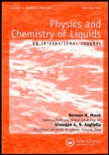
PHYSICS AND CHEMISTRY OF LIQUIDS
Bridging Physics and Chemistry through Liquid StudiesPHYSICS AND CHEMISTRY OF LIQUIDS is a distinguished academic journal dedicated to the exploration and advancement of liquid-state scientific research within the fields of physics and chemistry. Published by Taylor & Francis Ltd, this esteemed journal features contributions that delve into various aspects of condensed matter physics, materials chemistry, and characteristics of electronic, optical, and magnetic materials. With an ISSN of 0031-9104 and an E-ISSN of 1029-0451, it has been disseminating valuable knowledge since its inception in 1968. The journal’s commitment to academic rigor is reflected in its current Q3 rankings across multiple categories, including condensed matter physics and physical chemistry. Although not open access, the journal remains a crucial resource for researchers, professionals, and students seeking to stay at the forefront of liquid research advancements. Its publications contribute significantly to the understanding of the interactions and behaviors of liquid materials, making it an indispensable asset in both academic and industrial contexts.
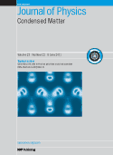
JOURNAL OF PHYSICS-CONDENSED MATTER
Innovating Research for a Solid-State Future.JOURNAL OF PHYSICS-CONDENSED MATTER, published by IOP Publishing Ltd, stands as a premier platform for the dissemination of impactful research in the fields of condensed matter physics and materials science. Since its inception in 1989, this journal has successfully bridged the gap between fundamental and applied research, delivering cutting-edge findings pertinent to both the academic community and industry professionals. Ranking in the Q2 category for both Condensed Matter Physics and Materials Science, it holds a respectable position within the scientific community, as evidenced by its Scopus rankings. With a commitment to fostering innovative research and promoting open dialogue, the journal offers a substantial collection of articles that contribute to the evolving landscape of materials science and physics. Researchers and students are encouraged to engage with the journal’s rich content, which not only enhances their academic pursuits but also plays a crucial role in advancing technologies based on solid-state materials.

Crystals is a premier open-access journal, published by MDPI since 2011, that focuses on the multidisciplinary fields of chemical engineering, condensed matter physics, inorganic chemistry, and materials science. With its E-ISSN 2073-4352, the journal is headquartered in Switzerland, and actively contributes to the global scientific community by facilitating the dissemination of high-quality research. Ranking in the Q2 quartile across multiple categories, including Chemical Engineering (miscellaneous) and Materials Science (miscellaneous) for 2023, Crystals provides a platform for innovative studies that span from fundamental research to practical applications. The journal's commitment to open access ensures that groundbreaking findings are readily available to researchers, professionals, and students alike, fostering an environment of collaboration and knowledge sharing that is essential in advancing the scientific understanding of crystalline materials.

Journal of Superconductivity and Novel Magnetism
Pioneering Research in Materials Science and MagnetismJournal of Superconductivity and Novel Magnetism, published by SPRINGER, is a premier venue for research in the dynamic fields of condensed matter physics and materials science. With an ISSN of 1557-1939 and an E-ISSN of 1557-1947, this journal provides an essential platform for disseminating innovative studies examining the complexities of superconductivity and magnetic phenomena. The journal is recognized for its contributions, holding a Q3 quartile ranking in both condensed matter physics and electronic, optical, and magnetic materials as of 2023. With a commitment to rigor and relevance, it features research that breaks new ground in understanding the properties and applications of superconducting materials, aiming to bridge fundamental science with technological advancements. Despite its lack of open access, the journal remains pivotal for researchers, professionals, and students keen to stay abreast of cutting-edge developments in the field, making it an indispensable resource for cultivating knowledge and promoting collaboration.
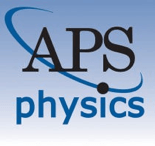
PHYSICAL REVIEW B
Elevating Knowledge in the Sciences of MaterialsPHYSICAL REVIEW B, published by the American Physical Society, is a leading journal in the field of condensed matter physics and materials science, particularly focusing on electronic, optical, and magnetic materials. With an ISSN of 2469-9950 and an E-ISSN of 2469-9969, this periodical has garnered a prestigious reputation, achieving a Q1 ranking in both relevant categories as of 2023. The journal has recorded significant impact as reflected in its Scopus ranks, notably positioned at #95 out of 434 in Condensed Matter Physics and #75 out of 284 in the Materials Science sector, illustrating its importance in advancing research and discussions in these critical areas. Although it does not offer open access, PHYSICAL REVIEW B remains an invaluable resource for academics, researchers, and professionals seeking to increase their understanding of contemporary issues in condensed matter and material sciences. Established in 2005, this journal continues to foster innovation and dissemination of knowledge, making it a cornerstone publication for those engaged in cutting-edge research.
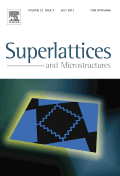
SUPERLATTICES AND MICROSTRUCTURES
Elevating knowledge in the fields of physics and engineering.SUPERLATTICES AND MICROSTRUCTURES is a premier journal dedicated to the exploration and dissemination of cutting-edge research in the fields of Condensed Matter Physics, Electrical and Electronic Engineering, and Materials Science. Published by Academic Press Ltd - Elsevier Science Ltd, this journal has established itself as an important platform for scholars and industry professionals to share their findings related to the design, fabrication, and application of superlattices and microstructured materials. With a commendable impact factor reflected in its rankings—positioned within the top quartile in Physics and Astronomy as well as Electrical and Electronic Engineering—it offers high visibility and influence in the academic community. The journal has covered significant contributions from 1985 to 2022, although access options have transitioned, making staying current essential for researchers and practitioners alike. This journal not only serves as a repository of knowledge but also fosters collaboration and innovation in materials science and related disciplines.
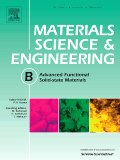
Materials Science and Engineering B-Advanced Functional Solid-State Materials
Shaping Tomorrow’s Technologies with Solid-State InsightsMaterials Science and Engineering B: Advanced Functional Solid-State Materials, published by Elsevier, stands as a pivotal platform in the realm of materials science, focusing on the development and characterization of advanced solid-state materials. With an ISSN of 0921-5107 and E-ISSN of 1873-4944, this journal operates out of the United Kingdom and addresses critical issues in condensed matter physics, mechanical engineering, and mechanics of materials. Its consistent recognition, evident in its Q2 quartile rankings across multiple engineering and physics categories and a respectable scope of convergence from 1988 to 2024, signifies its substantial contribution to the field. Researchers and professionals seeking a venue for cutting-edge work will appreciate the journal's commitment to advancing knowledge in functional materials, with its open access features ensuring that innovative findings are readily accessible. Join a community of leading scholars engaging with the latest advancements, shaping the future of materials science.

SEMICONDUCTORS
Exploring the depths of atomic and molecular physics.SEMICONDUCTORS, published by PLEIADES PUBLISHING INC, is a prominent journal that provides a platform for researchers and professionals in the fields of Atomic and Molecular Physics, Condensed Matter Physics, and Electronic, Optical and Magnetic Materials. With an ISSN of 1063-7826 and an E-ISSN of 1090-6479, the journal has been diligently disseminating knowledge since its inception in 1996 and continues to pave the way for innovative research until 2024. Although currently unclassified in the Open Access model, its influence is underscored by its rankings in Scopus, where it ranks in the 21st-22nd percentile across critical scientific categories. SEMICONDUCTORS serves as an essential resource for cutting-edge research, fostering a greater understanding of semiconductor materials and their applications, thereby assisting the scientific community in pushing the boundaries of technology and innovation.

Physics and Chemistry of Solid State
Fostering Interdisciplinary Dialogue for Tomorrow's ScientistsPhysics and Chemistry of Solid State is a distinguished open access journal published by Vasyl Stefanyk Precarpathian National University in Ukraine, dedicated to advancing research in the fields of condensed matter physics, materials science, and physical and theoretical chemistry. Since its inception in 2000, the journal has provided a platform for the dissemination of innovative ideas and original research findings, contributing significantly to the global scientific community. With a variety of access options, it facilitates the sharing of knowledge and collaboration among researchers worldwide. The journal has garnered recognition with respectable rankings in Scopus, positioning itself among the significant publications in its domain, particularly noted for its contributions to materials science and condensed matter physics. As it moves through its converged years from 2018 to 2024, Physics and Chemistry of Solid State aims to foster interdisciplinary dialogue and prepare the next generation of scientists to tackle complex challenges in solid-state research.
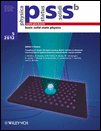
PHYSICA STATUS SOLIDI B-BASIC SOLID STATE PHYSICS
Pioneering Discoveries in Solid State Physics Since 1961PHYSICA STATUS SOLIDI B-BASIC SOLID STATE PHYSICS, published by Wiley-VCH Verlag GmbH in Germany, is an esteemed journal within the condensed matter physics sphere, covering pivotal advancements in basic solid state physics. With a rich history dating back to 1961, it serves as a scholarly platform for researchers, professionals, and students alike, providing insights into the fundamental properties and applications of electronic, optical, and magnetic materials. The journal currently holds a respectable Q3 ranking in both Condensed Matter Physics and Electronic, Optical, and Magnetic Materials as of 2023, indicating its impactful contributions to these fields despite its competitive landscape. While it does not offer open access, its comprehensive research findings are critical for those engaged in innovative material science research. With a convergence period extending to 2024, PHYSICA STATUS SOLIDI B continues to play a significant role in facilitating knowledge exchange and fostering advancements in solid state physics.